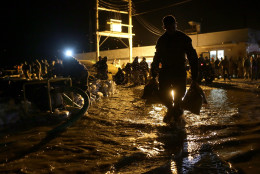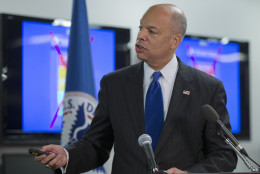FEMA
-
Planning can't change the weather, but it can improve the time between disaster striking and people getting their lives back together.
October 11, 2016 -
Agencies are starting to embrace rotational assignments — one of the four main priorities in a recent executive order on the Senior Executive Service — as an opportunity to give SES members new experiences and developmental opportunities.
October 05, 2016 -
Welcome to #FedFeed, a daily collection of federal ephemera gathered from social media and presented for your enjoyment.
August 31, 2016 -
Emergency management agencies say existing social media channels are often their best way to crowdsource and collect important information during a major weather event or natural disaster. Agencies such as FEMA and the Health and Human Services Department are adapting their strategy to embrace the "social listening" concept.
March 24, 2016 -
The Federal Emergency Management Agency wants state and local governments to pony up more money before receiving FEMA assistance for recovery after disasters. A proposed rule would create a sort of disaster deductible. FEMA believes that would persuade state and local governments to take more action to reduce risk. Joshua Batkin, director of FEMA's Office of External Affairs, spoke to Federal News Radio's Eric White on Federal Drive with Tom Temin about the proposed rule.
February 09, 2016 -
The provision tells agencies to show how program performance metrics are tied to priority goals.
January 20, 2016 -
The Federal Emergency Management Agency's Office of Inspector General warned the agency that not having a centralized IT system can result in delayed assistance during a disaster.
December 31, 2015 -
Department of Homeland Security Secretary Jeh Johnson introduced a new advisory bulletin under the National Terrorism Advisory System.
December 16, 2015 -
FEMA may have improperly handed out $250 million in disaster relief funds to Hurricane Sandy survivors who were already covered by their own insurance companies. That's according to a new audit by Homeland Security’s Office of Inspector General, which used data analytics tools to spot potential improper payments. The OIG found up to 29,000 Sandy aid applicants may have gotten the payments even though they had insurance. John Kelly, assistant inspector general for Emergency Management Oversight at DHS, talked about the findings with In Depth guest host Jared Serbu.
October 29, 2015 -
FEMA is re-engineering DisasterAssistance.gov to better meet the needs of customers during and after major events. The project should be done in about two years.
October 05, 2015 Saturday marks the ten-year anniversary of the day Hurricane Katrina made landfall in southern Louisiana. The Pentagon says in the decade since then, it’s made several changes that are intended to get Defense Department resources to local disaster zones within hours instead of days.
August 28, 2015-
The 10-year anniversary of Hurricane Katrina is an opportunity to revisit some lessons learned after that storm. For example, more disasters are happening now than historically. Don Kettl, a professor of public policy at the University of Maryland, and two of his colleagues write about the six major lessons to learn from Katrina. He tells In Depth with Francis Rose that more people expect government help, when a natural disaster strikes.
August 17, 2015 -
The House Appropriations Committee approved the Homeland Security appropriations bill, which is $2.1 billion or 5 percent less than what President Barack Obama asked for in his Fiscal Year 2016 budget request.
July 14, 2015 -
The FEMA Operation Precious Cargo Team was dispatched last summer to the South Texas border to coordinate the government's response to a massive humanitarian crisis.
June 30, 2015 -
Customs and Border Protectionhad an unexpected humanitarian crisis on its hands last summer. Tens of thousands of South American children crossed the Southwest Border. Shelters got full too quickly and it took CBP 45 to 60 days to reunite children with their families. Kevin Hannes is a federal coordinating officer at the Federal Emergency Management Agency in Denton, Texas. His team set up an emergency operations center, streamlined the process for tracking cases and worked with several different agencies to hand out food and clothing. By the end of the crisis the reunion process took 10 days. Hannes is a finalist for a Service to America medal in the management excellence category. He tells In Depth with Francis Rose what happened at the border stations last summer, and why it was taking so long to get kids reunited with their families.
June 18, 2015













